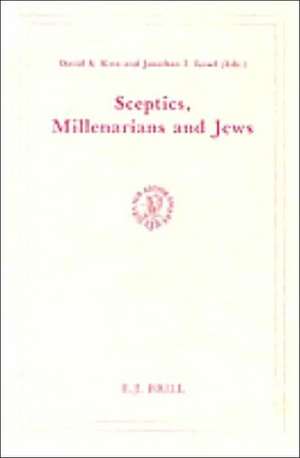David Hume's Critique of Infinity: Brill's Studies in Intellectual History, cartea 102
Autor Dale Jacquetteen Limba Engleză Hardback – 13 noi 2000
Din seria Brill's Studies in Intellectual History
- 18%
 Preț: 919.94 lei
Preț: 919.94 lei - 18%
 Preț: 546.15 lei
Preț: 546.15 lei - 18%
 Preț: 676.34 lei
Preț: 676.34 lei - 18%
 Preț: 680.76 lei
Preț: 680.76 lei - 18%
 Preț: 685.35 lei
Preț: 685.35 lei - 18%
 Preț: 666.75 lei
Preț: 666.75 lei - 18%
 Preț: 675.94 lei
Preț: 675.94 lei - 18%
 Preț: 679.13 lei
Preț: 679.13 lei - 18%
 Preț: 675.79 lei
Preț: 675.79 lei - 18%
 Preț: 684.75 lei
Preț: 684.75 lei - 18%
 Preț: 685.11 lei
Preț: 685.11 lei - 18%
 Preț: 686.82 lei
Preț: 686.82 lei -
 Preț: 232.42 lei
Preț: 232.42 lei - 18%
 Preț: 1025.52 lei
Preț: 1025.52 lei - 18%
 Preț: 686.22 lei
Preț: 686.22 lei - 18%
 Preț: 682.78 lei
Preț: 682.78 lei - 18%
 Preț: 669.19 lei
Preț: 669.19 lei - 18%
 Preț: 677.34 lei
Preț: 677.34 lei - 18%
 Preț: 678.97 lei
Preț: 678.97 lei - 18%
 Preț: 677.10 lei
Preț: 677.10 lei - 18%
 Preț: 677.49 lei
Preț: 677.49 lei - 18%
 Preț: 676.82 lei
Preț: 676.82 lei - 18%
 Preț: 675.90 lei
Preț: 675.90 lei - 18%
 Preț: 676.95 lei
Preț: 676.95 lei - 18%
 Preț: 680.55 lei
Preț: 680.55 lei - 18%
 Preț: 677.57 lei
Preț: 677.57 lei - 18%
 Preț: 1036.64 lei
Preț: 1036.64 lei - 18%
 Preț: 676.48 lei
Preț: 676.48 lei - 18%
 Preț: 680.76 lei
Preț: 680.76 lei - 18%
 Preț: 680.13 lei
Preț: 680.13 lei - 18%
 Preț: 670.77 lei
Preț: 670.77 lei - 18%
 Preț: 674.79 lei
Preț: 674.79 lei - 18%
 Preț: 679.99 lei
Preț: 679.99 lei - 18%
 Preț: 678.36 lei
Preț: 678.36 lei - 18%
 Preț: 670.83 lei
Preț: 670.83 lei - 18%
 Preț: 681.07 lei
Preț: 681.07 lei - 18%
 Preț: 682.71 lei
Preț: 682.71 lei - 18%
 Preț: 681.98 lei
Preț: 681.98 lei - 18%
 Preț: 679.07 lei
Preț: 679.07 lei - 18%
 Preț: 678.90 lei
Preț: 678.90 lei - 18%
 Preț: 682.32 lei
Preț: 682.32 lei - 18%
 Preț: 572.93 lei
Preț: 572.93 lei - 18%
 Preț: 680.69 lei
Preț: 680.69 lei - 18%
 Preț: 687.30 lei
Preț: 687.30 lei - 18%
 Preț: 681.61 lei
Preț: 681.61 lei - 18%
 Preț: 681.31 lei
Preț: 681.31 lei - 18%
 Preț: 679.21 lei
Preț: 679.21 lei - 18%
 Preț: 679.59 lei
Preț: 679.59 lei - 18%
 Preț: 716.18 lei
Preț: 716.18 lei
Preț: 681.85 lei
Preț vechi: 831.53 lei
-18% Nou
Puncte Express: 1023
Preț estimativ în valută:
130.49€ • 135.94$ • 108.50£
130.49€ • 135.94$ • 108.50£
Carte indisponibilă temporar
Doresc să fiu notificat când acest titlu va fi disponibil:
Se trimite...
Preluare comenzi: 021 569.72.76
Specificații
ISBN-13: 9789004116498
ISBN-10: 9004116494
Pagini: 384
Dimensiuni: 155 x 235 x 32 mm
Greutate: 0.88 kg
Editura: Brill
Colecția Brill
Seria Brill's Studies in Intellectual History
ISBN-10: 9004116494
Pagini: 384
Dimensiuni: 155 x 235 x 32 mm
Greutate: 0.88 kg
Editura: Brill
Colecția Brill
Seria Brill's Studies in Intellectual History
Public țintă
Students (advanced undergraduate and graduate), professional scholars, and other readers interested in David Hume, philosophy, metaphysics, epistemology, philosophy of mathematics, philosophy of science, history of philosophy, history of mathematics, history of science, Enlightenment studies, history of ideas, history of technology, and intellectual background of contemporary Western civilization.Cuprins
Preface
Acknowledgments
INTRODUCTION: TWO-FOLD TASK OF HUME’S CRITIQUE
Hume’s Strict Finitism
Dialectical Structure of Hume’s Critique
Historical-Philosophical Context
Bayle’s Trilemma for the Divisiblity of Extension
Legacy and Influence of Berkeley on Hume’s Metaphysics of Space and Philosophy of Mathematics
PART I. THE INKSPOT EXPERIMENT
1. Minima Sensibilia
2. Against Mind-Mediated Ideas of Infinite Divisibility
3. Hume’s Inkspot Metaphysics of Space: Finite Divisibility of Extension into Sensible Extensionless Indivisibles
PART II. REFUTATIONS OF INFINITE DIVISIBILITY
4. Hume’s Reductio Arguments
5. Antithesis in Kant’s Second Antinomy
6. Classical Mathematics and Hume’s Refutation of Infinite Divisibility
7. Infinite Divisibility in Hume’s First Enquiry
CONCLUSION: HUME AGAINST THE MATHEMATICIANS
On the Experiential Origin of Ideas
Mathematics and Science Without Infinity
Hume’s Finitism and Cantor’s Transfinite Cardinals
Resilience of Hume’s Critique
AFTERWORD: HUME’S AESTHETIC PSYCHOLOGY OF DISTANCE, GREATNESS, AND THE SUBLIME
Concepts of the Sublime
Infinity, Greatness, and the Sublime
Hume’s Philosophical Psychology and the Aesthetics of Greatness and the Sublime
Aesthetics of Great Distance in Space and Time
Greatness, Difficulty, and Hume’s Aesthetics of the Sublime
Bibliography
Index
Acknowledgments
INTRODUCTION: TWO-FOLD TASK OF HUME’S CRITIQUE
Hume’s Strict Finitism
Dialectical Structure of Hume’s Critique
Historical-Philosophical Context
Bayle’s Trilemma for the Divisiblity of Extension
Legacy and Influence of Berkeley on Hume’s Metaphysics of Space and Philosophy of Mathematics
PART I. THE INKSPOT EXPERIMENT
1. Minima Sensibilia
2. Against Mind-Mediated Ideas of Infinite Divisibility
3. Hume’s Inkspot Metaphysics of Space: Finite Divisibility of Extension into Sensible Extensionless Indivisibles
PART II. REFUTATIONS OF INFINITE DIVISIBILITY
4. Hume’s Reductio Arguments
5. Antithesis in Kant’s Second Antinomy
6. Classical Mathematics and Hume’s Refutation of Infinite Divisibility
7. Infinite Divisibility in Hume’s First Enquiry
CONCLUSION: HUME AGAINST THE MATHEMATICIANS
On the Experiential Origin of Ideas
Mathematics and Science Without Infinity
Hume’s Finitism and Cantor’s Transfinite Cardinals
Resilience of Hume’s Critique
AFTERWORD: HUME’S AESTHETIC PSYCHOLOGY OF DISTANCE, GREATNESS, AND THE SUBLIME
Concepts of the Sublime
Infinity, Greatness, and the Sublime
Hume’s Philosophical Psychology and the Aesthetics of Greatness and the Sublime
Aesthetics of Great Distance in Space and Time
Greatness, Difficulty, and Hume’s Aesthetics of the Sublime
Bibliography
Index
Notă biografică
Dale Jacquette, Ph.D. (1983) in Philosophy, Brown University, is Professor of Philosophy at The Pennsylvania State University. He has written numerous books and articles on logic, metaphysics, philosophy of mind, and aesthetics, and has recently published Wittgenstein’s Thought in Transition (Purdue University Press, 1998).
